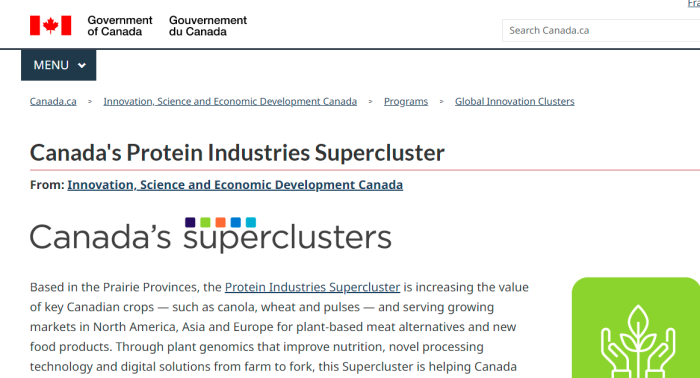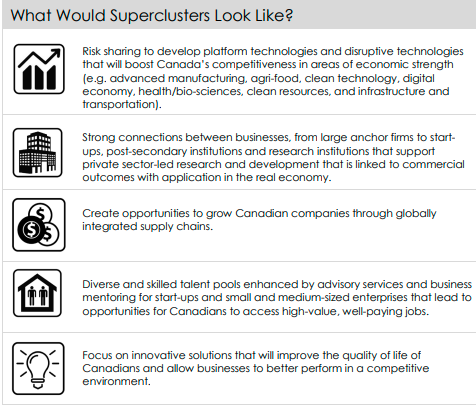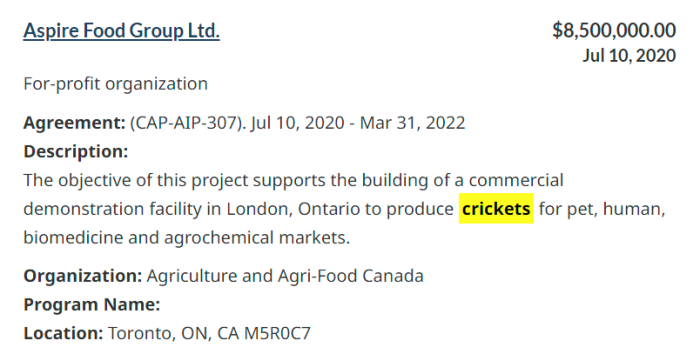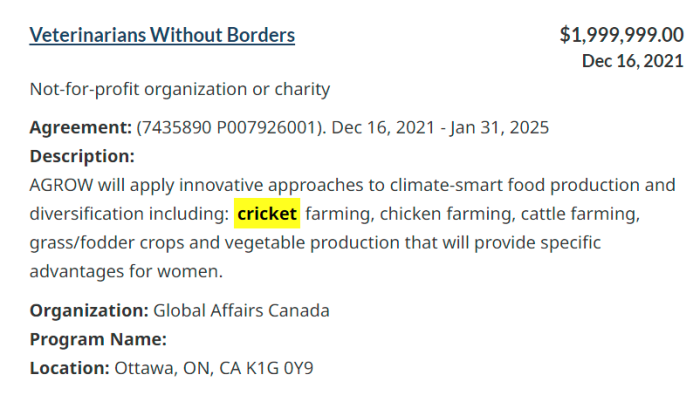
It was announced in the 2017 Federal budget that there would be millions in spending for so-called “superclusters“. These are just areas of research. One of those was Agri-Foods, which turned out to just be ways to get rid of meat altogether.
At the time of writing this, there are several projects on the go, including:
- Plant-based seafood alternatives
- Plant-based foods and beverages
- A soy processing plant in Eastern Canada
Strangely, there don’t seem to be many — or any — initiatives to get Canadians into farming, raising animals for food. It’s almost as if things are going in a different direction.

ACCELERATING INNOVATION
THROUGH SUPERCLUSTERS
Clusters—dense areas of business activity that contain large and small companies, post-secondary institutions and specialized talent and infrastructure—energize economies and act as engines of growth. They create jobs, encourage knowledge sharing, drive business specialization and help to attract “anchor” companies from around the world. Successful clusters like the ones in Silicon Valley, Berlin, Tel Aviv and the Toronto-Waterloo corridor contribute significantly to both regional and national economies.
Budget 2017 proposes to invest up to $950 million over five years, starting in 2017–18, to be provided on a competitive basis in support of a small number of business-led innovation “superclusters” that have the greatest potential to accelerate economic growth.
The competition will launch in 2017 and focus on superclusters that enhance Canada’s global competitiveness by focusing on highly innovative industries such as advanced manufacturing, agri-food, clean technology, digital technology, health/bio-sciences and clean resources, as well as infrastructure and transportation.
This is from page 79 of the 2017 budget. So, this wasn’t just some spur of the moment idea. It’s been in the works for a long time. The goal is apparently to generate at least $25 billion per year from sales in plant based foods and materials, according to the 2022-2023 Annual Report from Protein Industries Canada.
It’s fair to assume that production will only ramp up as far as the plant based industry goes. Again, there’s little to no enthusiasm to increase meat production.

Other “superclusters” include: digital technology, advanced manufacturing, artificial intelligence, and oceans (presumably a climate initiative).
On the issue of intellectual property, the following is stated:
“The IP strategy sets out how each Supercluster will strike a balance between providing its members with access to project-generated IP, while protecting the commercial interests of individual project partners, including small-and-medium-sized businesses. This encourages more collaboration and innovation, leading to good commercial outcomes.”
In other words, Canadians are paying to subsidize companies that will keep at least a portion of the IP that they create. It would be interesting to know how exactly this balance would be struck.
Also, this program is open to foreign companies, provided they do at least some business in Canada. However, there aren’t any minimum requirements stated.
And what other money has been handed out lately?
| COMPANY | DATE | SUBJECT | AMOUNT |
|---|---|---|---|
| The Alfalfa Inc. | Sep 14, 2018 | Insecticidal Plant-Based Product | $200,997.00 |
| Gfi Brands Inc. | Nov 16, 2021 | High Nutrition Plant Based Foods | $375,018.00 |
| Ingredion | Aug 12, 2019 | Plant-Based Ingredient Markets | $2,145,000.00 |
| Innovation Virentia Inc. | Sep 14, 2018 | Insecticidal Plant-Based Product | $200,997.00 |
| Jewish CC Montreal | Aug 9, 2019 | Global Certification For Plant-Based Products | $819,638.00 |
| Konscious Foods Canada | Nov 18, 2021 | Plant-Based Seafood Products | $36,000.00 |
| Novagevity Inc. | Apr 1, 2020 | Plant Based Meal Replacement | $78,805.00 |
| Novagevity Inc. | Dec 22, 2021 | Plant Based Beverage | $200,311.00 |
| Rps Biologiques Inc. | Oct 26, 2021 | Plant-Based Fish Meal Additive | $23,360.00 |
| Spiderwort Inc. | Oct 11, 2021 | Plant-Based Fish Fillet | $280,000.00 |
| UBC | Mar 1, 2022 | Pea Proteins, Plant-Based Foods | $142,946.00 |
| Vivus Pets Inc. | Jan 18, 2022 | Gluten Free Plant Based Dog Food | $50,000.00 |
Are we noticing a pattern here?
There are, of course, plenty of eco-nuts who claim that meat must be done away with in order to prevent global warming. It’s almost as if there are different excuses and lies being promoted to drastically change human behaviour. More on that another time.
For some extra reading, here is the last piece on cricket production and subsidies being handed out by the Federal Government.
(1) https://www.proteinindustriescanada.ca/news/how-a-plant-based-seafood-alternative-is-helping-canada-reduce-its-carbon-footprint
(2) https://www.proteinindustriescanada.ca/news/increasing-plant-based-food-and-beverage-options-through-oat-ingredient-innovation
(3) https://www.proteinindustriescanada.ca/news/strategically-increasing-eastern-canadas-processing-capacity
(4) https://ised-isde.canada.ca/site/innovation-superclusters-initiative/en/frequently-asked-questions
(5) https://www.budget.gc.ca/2017/docs/plan/budget-2017-en.pdf
(6) Canada Budget 2017 Superclusters
(7) https://www.proteinindustriescanada.ca/uploads/Corporate-Plan-2022-23.pdf
(8) https://search.open.canada.ca/grants/
(9) https://canucklaw.ca/cricket-production-subsidies-aspire-food-group/



